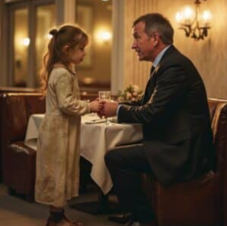The restaurant hummed with soft laughter and clinking glasses. Dressed in tailored suits and shimmering gowns, the patrons enjoyed their evening, unaware that everything was about to change.
From the shadows outside, a frail girl watched. Hunger clung to her like a second skin. The scent of roasted garlic and fresh bread pulled her forward, past the glimmering windows, to the alley behind the restaurant—a place she knew all too well.
Emily had memorized the rhythm of this place: the kitchen door that creaked open at odd hours, the dumpsters that often held scraps warm enough to still steam in the night air.
Shivering beneath an oversized hoodie, she crouched beside a bin and began to search. Her fingers brushed against discarded napkins, damp cartons, and, finally, something solid. She pulled out a nearly untouched piece of bread, still wrapped in its plastic. Relief washed over her. It wasn’t much, but it was something.
Then a strange stillness settled over her. A tingle at the base of her neck. Someone was watching.
She glanced toward the kitchen window—just slightly ajar—and crept closer. Inside, chefs rushed about in crisp uniforms, flames danced under steel pans, and orders were barked over the din. It was almost beautiful in its chaos.
But then she appeared.
A woman in a crimson dress, heels tapping against the tile like a metronome. She didn’t belong in a kitchen, not with that elegance, that poise. Emily knew her from the torn magazines she’d found before—Victoria Adams. The wife of Robert Adams, the powerful businessman seated just beyond the swinging doors.
Emily narrowed her eyes. Something was off.
Victoria hovered near a counter where a chef was finishing a dish. While he turned to speak to a waiter, she reached into her designer handbag and retrieved a tiny black vial.
Emily’s breath hitched.
Victoria tilted the bottle. A dark liquid slipped out, drop by drop, onto the perfectly plated meal. She moved like someone who had done this before.
And then, just as quickly, she was gone.
Emily’s heart pounded. That dish—poisoned. She was sure of it. She didn’t know how or why, but she knew she couldn’t let someone eat it.
She sprinted around the building and slipped through the front door. Her ragged clothes and dirt-smudged face drew glances, but she didn’t care. Her eyes locked on the man at the table.
Robert Adams.
She walked right up to him and whispered, “Don’t eat that. Your wife… she put something in it.”
The atmosphere cracked.
Forks paused mid-air. Conversations stopped mid-sentence.
Robert looked down at the trembling child, his brow furrowed. “What did you say?”
Emily pointed to the plate. “I saw her. Through the kitchen window. She poured something from a bottle into your food.”
He looked across the room. Victoria was walking back toward the table, smiling with polished grace. She froze, just briefly, when she saw Emily.
“Who is this?” she asked coolly, her voice laced with amusement.
“She says you poisoned my dinner,” Robert said slowly, eyes narrowing.
Victoria laughed, crisp and hollow. “Are you really listening to a homeless child?”
Emily didn’t flinch. “Switch plates with him,” she said quietly. “If you’ve got nothing to hide.”
The challenge hung in the air like a dropped chandelier.
Victoria’s smile stiffened. “Don’t be absurd.”
Robert pushed the plate toward her. “Just one bite.”
“I already ordered a salad,” she said too quickly.
He lifted a forkful. “Then humor me.”
Her hands shook. Her mask began to slip.
“I’m not eating your food!” she snapped.
Robert stood slowly, the realization dawning. “How long, Victoria? How long have you been planning this?”
“I—this is crazy!” she stammered, backing away.
“Call the police,” Robert said to a waiter. “And save that plate.”
Two nearby diners, both off-duty officers, rose to block her exit.
Chaos rippled through the room. And in the eye of the storm stood Emily, silent and small, watching her world shift beneath her feet.
Later, as officers led Victoria away, Robert turned back to the girl. “What’s your name?”
“Emily.”
“Do you have anyone? Family?”
She shook her head.
He crouched beside her, offering a card and a thick wad of cash. “Come see me tomorrow. I think there’s a better life waiting for you than cold bread and alleyways.”
Three Years Later
The same restaurant, but a different scene.
Emily sat at a table by the window, her hair neatly tied, a modest dress hugging her frame. She wasn’t hiding anymore. She belonged.
Across from her sat Robert Adams—now her guardian, mentor, and the man whose life she’d saved.
“You know,” he said, smiling over his glass, “I grew up in an orphanage. Maybe that’s why I knew you were telling the truth that night.”
Emily smiled, warm and calm. “You’ve told me.”
“But it’s still true. That night, you didn’t just save me. You reminded me what it means to see through people, not just at them.”
Victoria Adams was now a memory, serving a long sentence in a cold cell.
Emily, once a forgotten child of the streets, was now the top student at the city’s most prestigious school—and the future of a growing empire.
Sometimes, salvation doesn’t come from knights or heroes. Sometimes, it arrives as a trembling hand clutching a piece of bread, and a voice brave enough to speak the truth when no one else would.










